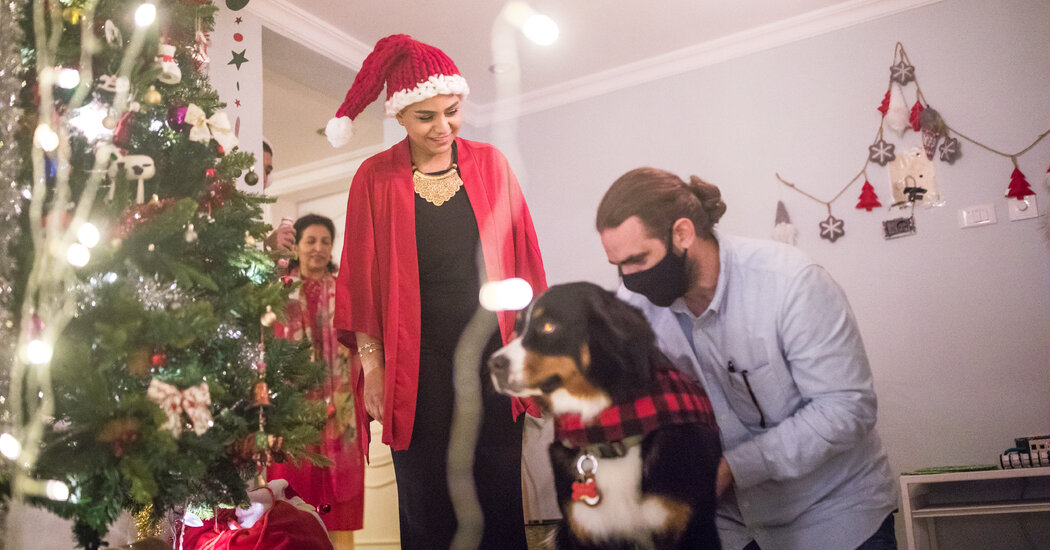
JEDDAH, Saudi Arabia — The lights had been strung, the guest list was set and the Santa hats were ready to go. For the first Christmas party they would openly throw in Saudi Arabia, Umniah Alzahery and Mike Bounacklie had even bought an ugly (but, of course, adorable) Christmas sweater for their Bernese mountain dog, Nova.
The only problem was the tree, which they had to procure in whispers from a gift store proprietor who quietly produced one from a darkened room.
“Everything was banned and we were confused, but Santa was a nice guy always,” said Ms. Alzahery, 35, recalling how her mother used to smuggle presents into her bed every Dec. 25 when she was growing up — this in a country famous for its ultraconservative form of Islam. “It doesn’t snow here, but I don’t think that Christmas has a location, honestly.”
Saudis and their government have long played peekaboo over certain behaviors that were officially banned, but privately widespread. These days, however, Christmas — long celebrated covertly among foreign workers and by a few Saudis with ties to the West — is bursting out of the shadows.
Over the last year or so, shop windows in Riyadh, the starchy capital, have begun to display wink-wink-nod-nod gift boxes in red and green and advent calendars, while cafes dispense gingerbread cookies and florists advertise “holiday trees.”
It is all possible because of Crown Prince Mohammed bin Salman, who prosecuted a disastrous war against Yemen and has been accused of ordering the killing of the journalist Jamal Khashoggi, but has won over millions of young Saudis by relaxing some of the stricter religious rules, showcasing what he hopes will be seen as a newly tolerant, moderate Saudi Arabia to attract foreign investment and tourists.
In recent years, the government has granted Saudi women more freedoms (while still locking up women’s rights advocates), introduced once-forbidden entertainments like electronic music concerts (while silencing conservative dissenters) and muzzled the virtue-and-vice police, who used occasionally to launch raids on non-Muslim religious gatherings. Many Saudis expect that even alcohol, once among the reddest of lines, will soon become legal.
But if most of the changes have been handed down from on high by the crown prince, they went down smoothly in part because many ordinary Saudis had long ago sneaked them into their lives.
Deprived of cinemas at home, Saudis would drive to Bahrain or fly to Dubai to see movies. In liberal circles, men and women mixed freely in private even as they remained segregated in public, while women went hijab-less overseas. And some Saudis who had lived or traveled in the West or learned about Western traditions from friends or pop culture would dress up for Halloween, throw their children birthday parties and exchange gifts on Christmas Day.
All very quietly.
On a recent evening, Maha Aljishi, 36, and her 13-year-old daughter were wandering through Riyadh Boulevard, an enormous new shopping, dining and entertainment complex that attracts throngs of Saudis until the small hours every night, when they stumbled on a giant gingerbread house and a herd of twinkling reindeer.
They were the kind of decorations Ms. Aljishi and her relatives once feared getting caught putting up at home. Ms. Aljishi, who studied in the United States, decorates a small Christmas tree every year that she used to hide when guests came over for dinner.
“Am I in Saudi Arabia?” Ms. Aljishi wondered aloud at the Boulevard. “Is this a dream?”
Her daughter asked what she meant.
“I said, ‘Just a few years ago, this was all haram,’” Ms. Aljishi recalled, using the Arabic word meaning forbidden by Islamic law.
Of course, Christmas is still officially haram in Saudi Arabia. Or perhaps, more accurately, like many social novelties that the authorities have not sanctioned but that Saudis are increasingly emboldened to try, it is not yet fully not haram.
That may explain why the word “Christmas” never appears at the Boulevard, nor in the shops and cafes that sell gingerbread men (the British chain Costa Coffee), “festive flavors” (Starbucks) and advent calendars stuffed with sweets (Bateel, a gourmet date retailer).
Once upon a time in the kingdom, almost no holidays were allowed, shunned as pagan customs. That included most of the Muslim ones, other than the two major feasts of Eid al-Fitr, marking the end of the holy fasting month of Ramadan, and Eid al-Adha, after the annual pilgrimage to Mecca.
In other Arab countries across the region, many with Christian minorities, Christmas is a festive season even for Muslims, who consider Jesus an important prophet.
But for Saudi clerics, Halloween was an alien import, Christmas was strictly taboo and New Year’s — because it did not square with the Islamic calendar, which differs from the Gregorian one — simply irrelevant. Celebrating even the Prophet’s birthday was prohibited; celebrating your own could get you labeled an infidel.
Raids on non-Muslim religious gatherings, textbooks that insulted Christians and Jews as “apes” or worse and seizures of holiday décor by customs authorities added to the atmosphere of intolerance.
Still, besides Christmas festivities held by foreigners, there have been some discreet Saudi celebrations for years in the country’s Eastern Province, where the American-founded oil giant Saudi Aramco exerted an Americanizing influence, and in the Red Sea city of Jeddah, which has always stood out for its slightly more permissive atmosphere.
And for all the religious authorities’ efforts, the Christmas spirit tended to seep into Saudi homes by way of Hollywood and social media.
Revan Moha, 19, has never left Saudi Arabia, but nonetheless was desperate to find a Christmas tree in Riyadh this December.
“Oh,” she said recently, “I wish it would snow!”
She was delighted to learn that trees were readily available in party supply stores and through Instagram sellers — artificial ones, of course.
Covert Christmas demand was apparently such that in 2018, the Saudi customs authorities were forced to warn on Twitter that Christmas trees were prohibited from entering the kingdom. Ridicule ensued.
In October 2020, a Riyadh party supply store, the Good Ship Lollipop, dared to display four Christmas trees, including one in the front window. Chris Congco, an employee, said he sold 30 fake trees that year. But then, at a nudge from the authorities, a Grinchy directive arrived from the owner: Take down the window display.
“I cannot question it,” Mr. Congco, 42, a Filipino from Manila who has celebrated Christmas privately every year during his decade working in Saudi Arabia, said on a recent evening. “In just 15 to 30 minutes, I collapsed the tree and put it in the back.”
This year, they decided to display the trees again, along with aisles crammed with elf hats, reindeer antlers, fake holly, snowmen, pine cones, glittery ornaments, nutcrackers and Santa hats. The only reason they have not sold as many trees as last year, Mr. Congco said, is that other Riyadh stores have joined the market, stiffening the competition.
Still, Christmas items accounted for about 70 percent of his sales for the last month, bought by a few Saudis as well as by expatriates.
If the authorities complain about the tree in the window this year, Mr. Congco has a plan: He will tell them it is “just a pine tree with snow.” He has strategically placed another plant next to it, so as to pass it off as a “forest” display if need be. “And it’s cold now,” he explained, “so we can say it’s winter.”
But he doubted it would come to that.
“It might not be officially allowed,” he said, “but it’s OK, yes, I think and I feel.”
For some uncountable number of Saudis, it is still very much not OK.
As the holiday season loomed last year, Assim Alhakeem, a Jeddah-based sheikh who fields religious queries online, published a YouTube video ruling against saying “Merry Christmas,” even as a polite greeting to Christian friends.
“People say that Christmas is not a religious festival anymore, New Year’s is OK to celebrate and to congratulate. This is total bogus,” he said. “It’s a major sin to imitate, to congratulate, to participate. You have your own religion, and I have my own religion.”
By contrast, the Saudi authorities appear to have moved on: The customs authorities’ anti-tree tweet was, at some point, quietly taken down.
Iman al-Dabbagh contributed reporting.







